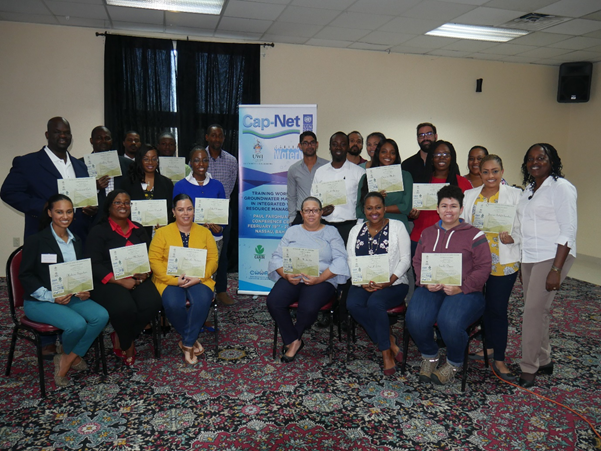On 19-21 February, the Caribbean WaterNet/CapNet-UNDP hosted a Training of Trainers (TOT) Workshop on Groundwater Management and Integrated Water Resource Management. The training was held in Nassau, The Bahamas and it was the result of the collaboration with The Bahamas Agricultural Health & Food Safety Authority (BAHFSA), the Faculty of Food and Agriculture, University of the West Indies St. Augustine Campus (FFA, UWI) the Global Water Partnership-Caribbean (GWP-C), Caribbean Agricultural Research and Development Institute (CARDI) and the Caribbean Waste Water Association (CWWA).
The workshop was launched with an opening ceremony chaired by Mr. Christopher Worrell, Executive Director of BAHFSA. Mr. Worrell expressed the urgent need for technical capacity enhancement as it pertains to groundwater management in Bahamas. Dr Michele Singh-CARDI- and Dr Ronald Roopnarine -Caribbean WaterNet/CapNet UNDP- emphasized the need for synergistic efforts towards integrated water resource management in the Caribbean.
Honourable, Michael C. Pintard -Minister of Agriculture & Marine Resources Bahamas- stressed the need for capacity building and public/private partnerships to invest in the ecosystem, the latter being critical in the establishment of opportunities in economic and social entrepreneurship that would bring attention to the threat that exists with very limited water resources.
The workshop was facilitated by Professor Jacob Opadeyi (Caribbean WaterNet/CapNet UNDP), Dr Ronald Roopnarine (Caribbean WaterNet/CapNet UNDP), Dr. Gaius Eudoxie (FFA, UWI), Ms. Lise Walter (CWWA) and Mr. Rick Johnston (WHO), who virtually joined in from Geneva.
During the first day participants focused on groundwater management in the context of the Sustainable Development Goals (SDGs), aquifer systems and the supply management challenges such as the type of aquifer, transfer capacity and physical & chemical interactions. Moreover, scales of groundwater management, associated challenges and potential strategies that could be applied to overcome these challenges were introduced.
The participants identified the reasons why water resources could be considered vulnerable in Bahamas. The factors identified were prone to pollution, close water table, rock porosity and permeability, lack of soils, groundwater lens, improper waste disposal habits, lack of main sewage, difficult and costly clean up.
During the second day the focus was oriented to monitoring and reporting mechanisms for the SDG 6 (Water and Sanitation) and groundwater legislation in the Bahamas. In addition, Groundwater Allocation and Economic and Financial Instruments, stakeholder participation in groundwater management and groundwater quality were explored.
The participants concluded the workshop by acknowledging that one of the most important immediate outcomes of the training was the internal networking and linkages fostered between the various local agencies.

